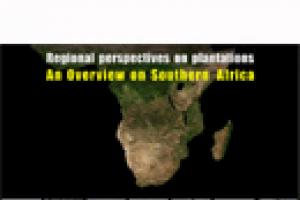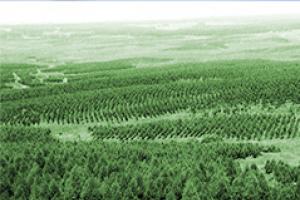GeaSphere and EcoDoc have just launched a report by Liane Greeff of EcoDoc Africa, “Thirsty alien trees, no water left and climate confusion – what version of sustainable development are we leaving our children”. The paper highlights the dramatic contradiction of the expansion of water intensive industrial timber plantations in South Africa under planned development programmes, and the scarce water resources of the country.
South Africa
Other information
30 January 2010
Natural forests aren’t the only landscapes being taken over by timber plantations. South Africa’s biologically diverse native grasslands are being rapidly replaced by water-intensive monocultures including eucalyptus and tropical pine – trees used for paper pulp exports.
Other information
30 May 2009
The Southern African organization GeaSphere has produced the online video “Earth Matters” which can be viewed (in two parts) athttp://www.wrm.org.uy/Videos/Earth_Matters.html
Publications
15 December 2008
Timber plantations in southern Africa are concentrated in South Africa, Zimbabwe and Swaziland, but they are also expanding in Mozambique. There are smaller areas in Angola, Zambia, Malawi and Tanzania. In South Africa, the largest areas are in the provinces of Mpumalanga, KwaZulu-Natal and the Eastern Cape, covering 1.5 million hectares of land. Additionally, an estimated 1.6 million hectares have been invaded by plantation species such as acacias (wattle), eucalyptus (gum) and pines.
Bulletin articles
27 September 2008
Monoculture is against nature, which is diverse. That is why an unnatural system like industrial plantations of tree monocultures triggers off several negative impacts. One of them is fire.
Bulletin articles
28 August 2008
Members of FoE Africa from Ghana, Togo, Sierra Leone, South Africa, Nigeria, Mauritius, Tunisia and Swaziland met for five days in Accra, Ghana reviewing issues that confront the African environment. A particular focus was placed on the current food crisis and agrofuels on the continent.
Bulletin articles
5 December 2007
In the general public perception, trees are automatically associated with environmental benefits, and there is consumer demand for “cuddly” offset tree-related projects, as opposed to the type of industrial emissions reductions that have dominated the Clean Development Mechanism (CDM) market. It is estimated that some 40% of carbon credits generated in the voluntary market comes from tree-related projects.
Other information
17 September 2007
Since the mid 1980's there has been a global trend towards the outsourcing of labour-intensive aspects of the plantation timber production model. In South Africa, the timber industry has openly admitted that its main motive for replacing permanent employment of workers with contract outsourcing was to cut costs.
Other information
1 September 2007
We the undersigned wish to register our concern over the certification of tree plantations by the FSC, which has granted a green label to monoculture plantations that have proven to be socially and environmentally destructive.
We are aware that the FSC is carrying out a review of its plantation certification policy, and it is our hope that the result of this process will be an end to the certification of these types of plantations by the FSC in the future.
Other information
19 June 2007
The web page http://www.southafrica.info, published for the International Marketing Council of South Africa, included in March an article which stated that “South Africa has identified the Eastern Cape and KwaZulu-Natal provinces as key for development in the forestry, wood and paper sector, with reforestation a vital part of the strategy”. For those who don’t know the forestry language, it is important to note that in South Africa the word “reforestation” really means planting vast monocultures of alien tree species on native grassland ecosystems.
Other information
23 May 2007
WRM has created a new video section in its website. You can find it in the page’s left column or going directly to http://www.wrm.org.uy/Videos/index.html.
Other information
30 September 2006
The history of the plantation industry in South Africa can be compared with the development of plantations elsewhere in the South: in Brazil, Aracruz Cellulose was developed under a military dictatorship; Indonesia’s pulp boom was planned and put into operation during the Suharto regime; Cambodia, Thailand and Chile provide other examples of how state oppression has benefitted pulp/plantations companies.


